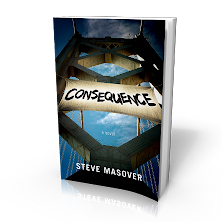How is this possible? It's the blogosphere, wouldn't you know?
Croxall's paper, a discourse on "contingent faculty" who can't afford to go to conferences like the MLA's, was read in a session he didn't attend by the moderator of the panel he would have participated in if he'd had the dough; then was tweeted, blogged about, posted on the author's own website, and read by an audience that exceeded any reasonable count he might have racked up in-person -- by more than two orders of magnitude.
The Absent Presence: Today's Faculty laments the sorry state and pathetic salary of adjunct faculty (Croxall's not-tenure-track salary puts him $100/month above the 2009 Federal Poverty Guidelines, he says, qualifying this 'full-time professor' for foodstamps). Like many of his peers, Croxall can't afford the expense of meeting face-to-face with his colleagues. Jennifer Howard gives the blow by blow in her Chronicle of Higher Education article of 29 December, and Prof. Croxall himself wrote an article reflecting on what it all meant in the CHE last week (this last is accessible only by subscription but should be reposted on Croxall's site by late April).
While I think it's sorry commentary on our culture's priorities that classes at institutions of higher education are being taught by well-qualified faculty who aren't paid enough to feed themselves, that's not what I'm going to blog about. Croxall does an admirable job of that, and he hardly needs my cheerleading.
What strikes me about his story is its confirmation of a 'zeitgeist impression' that faculty engagement with peers and students is being pushed off of campuses and into virtual space.
This is hardly unusual or below-the-radar:
- As of this weekend, Facebook has over 400 million active users, half of whom log on daily, and each of whom has, on-average, 130 "friends"
- Twitter is claiming 50 million tweets tweeted per day as of last month
- The Radicati Group reports that 156 billion non-corporate e-mails are sent every day, of which about 19% are not spam (that's nearly 30 billion "real" e-mail messages sent daily). That figure is barely exceeded by the US Postal Service figures for "single piece letters and cards" in 2009. [Guess the direciton in which each of these statistics is heading?]
In a higher ed context, the most recent stats published by the US Dept of Education count 66% of postsecondary educational institutions that offer distance education programs; two thirds of these are degree programs. [These numbers are for the 2006-07 academic year. This year's figures are probably higher.]
Is any of this a good thing?
The question with respect to on-line learning is debated often and vigorously, and I won't pretend to have The Answer. Similarly, the quality of research produced in (relative) isolation from peers is difficult to compare quantitatively with scholarship produced in a milieu that offers opportunities for interaction and collaboration of the kinds Professor Croxall describes.
So I'm left little choice but to speculate.
One of my own personal touchstones on the intersection of humans and technology, mentioned in a prior post, is a book called Four Arguments for the Elimination of Television by Jerry Mander. In Four Arguments, Mander asserts that a viewer's experience of what is piped through a television set is flattened experience. This is pretty obvious: television transmits no smells, tastes, or tactile sensation; limits the range of auditory and visual experience to the technology's bandwidth; and at best discourages interaction between the viewer and the viewed (such interaction is most often completely off the table). And flattened is lessened, Mander argues, not least because the technology tends to lull a viewer into believing that surrogate experience is substantively equivalent to the real thing and that s/he therefore 'knows' something better than limited perception permits.
This strikes me as a close analog to attempts to substitute highly mediated interchange for real interaction, as in on-line learning or virtual exchanges among academic peers.
While the circumspect reader may bridle at extrapolating too much from so little, the following morsel crossed my path last week (also thanks to CHE), and suggests a modern aspect of the limiting role of digital technology in mediating knowledge:
In October of last year, the results of a study conducted on subjects at Arizona State University were published in Human Factors: The Journal of the Human Factors and Ergonomics Society. The study, titled To Scroll or Not to Scroll: Scrolling, Working Memory Capacity, and Comprehending Complex Texts concludes that "scrolling negatively affects learning from text" compared to paginated material (e.g., books or books presented on screens that do not require scrolling to read). What this means, once you've sifted through the academic prose, data tables, and statistical methodologies, is that it's harder to retain complex information when you read it on your average web page, as opposed to reading it in a book (or on an e-reader that organizes information in single pages that one views discretely, in a sequence).
So what happens when faculty don't talk to each other in open, face-to-face, multiparty, interactive dialog ... but e-mail, blog, and tweet instead? What happens when students engage in something that mashes up television, video games, and web-surfing rather than read books & interact with peers and professors in lecture halls, seminar rooms, and office hours?
I suppose we're finding out now, like it or not.








